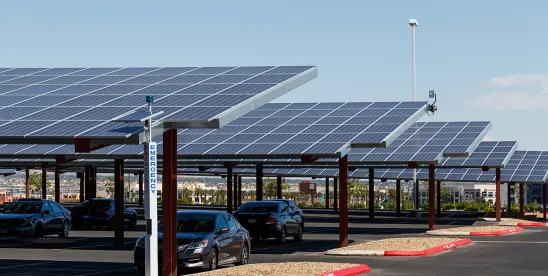There is a lot of buzz around clean technology, distributed energy resources (DERs), microgrids, and other technological innovations in the renewable energy and clean transport industries and how these developments can contribute to solving longstanding environmental justice issues. As these innovations develop, energy markets will undergo substantial changes to which consumers and industry participants alike will need to adapt and leverage.
DEPARTMENT OF ENERGY ANNOUNCES FUNDING FOR SOLAR MANUFACTURING AND RECYCLING INNOVATION PROJECTS
On 14 July 2022, the U.S. Department of Energy (DOE) announced US$56 million in funding aimed to spur innovation in solar manufacturing and recycling. This new funding comes in addition to US$26 million of funds aimed at similar goals. US$18 million has been contributed to the Technology Commercialization Fund that supports seven proposed National Laboratory projects focused on tackling commercialization issues faced by DOE-funded technologies. Another US$8 million in research and development funding for small solar companies to develop solar-thermal power, power electronics, and solar-powered water technologies.
The new funding consists of two separate tranches of funding opportunities. The first budget line allocates US$29 million in fiscal year 2022 (FY22) for Photovoltaics (PV) Research and Development, geared toward supporting projects that increase the reuse and recycling of solar technologies. That funding, which includes US$10 million from the Bipartisan Infrastructure Law, also supports projects that reduce the manufacturing costs of PV cells and bolster the production of PV cells made from perovskites. The second allocation provides US$27 million in FY22 to a Solar Manufacturing Incubator geared toward support efforts to commercialize new technologies that will in turn expand private investment in U.S. solar manufacturing. This includes projects that can help bolster manufacturing processes and boost the domestic manufacturing of PV made from cadmium telluride rather than silicon.
DOE also issued a Request for Information for solar and transportation companies to submit feedback regarding challenges and opportunities for vehicle-integrated PV technologies such as solar-power cars, RVs, trains, boats, and planes.
ONEIDA NATION RESERVATION RECEIVES FEDERAL GRANT FOR RENEWABLE ENERGY
On 19 July 2022, the U.S. Department of Commerce announced a US$648,339 grant to support sustainable energy on the Oneida Nation Reservation in northeast Wisconsin. The grant is funded by the American Rescue Plan Act of 2021, part of the U.S. Congressional coronavirus stimulus package. Assistant Secretary of Commerce for Economic Development Alejandra Y. Castillo stated that the investment “will support [the Oneida Nation’s] efforts to transition to renewable energy to not only build economic resiliency on the reservation, but also diversify its economy and create energy sector-related jobs.” This grant signals the U.S. government’s commitment to partnerships with Native American tribes as part of its efforts to transition to a greater energy mix from renewable resources.
The grant funds will be utilized to develop a strategic energy transition plan to develop a Tribal Utility Authority for the purpose of developing a utility-scale solar facility and electric vehicles for tribal operations. The grant funding also provides for the employment of contractors and staff for a period of four years to implement the plan. The Oneida Nation, located in Wisconsin’s Brown and Outagamie Counties, totals 65,400 acres, home to approximately 16,000 Oneida tribal members. The Oneida Tribe of Indians of Wisconsin is a sovereign government and a federally-recognized treaty tribe of the United States.
GKN HYDROGEN AND SOCALGAS COLLABORATE WITH U.S. DEPARTMENT OF ENERGY ON GREEN HYDROGEN STORAGE
On 30 June 2022, GKN Hydrogen and SoCalGas announced they are collaborating with the U.S. Department of Energy’s National Renewable Energy Laboratory (NREL) on a green hydrogen storage project. GKN Hydrogen developed a hydrogen storage system—called HY2MEGA—that stores hydrogen in a solid state, under low pressure, while maintaining a small footprint. The collaborative project will connect two HY2MEGA systems to an electrolyzer and fuel cell on the NREL’s campus in Boulder, Colorado. Using renewable energy sources, the electrolyzers will convert water to hydrogen to be stored in the HY2MEGA systems. GKN Hydrogen estimates that the two HY2MEGA systems will create a total of 500 kg of on-site hydrogen storage.
The project aims to demonstrate that large scale green hydrogen storage is feasible for use in the transition away from fossil fuels. SoCalGas, in turn, intends to use the large-scale hydrogen storage developed by the project to “help accelerate the commercialization and deployment of green hydrogen projects.” The project is estimated to take three years and will launch at the end of 2022.
David Wang also contributed to this article.






 />i
/>i
